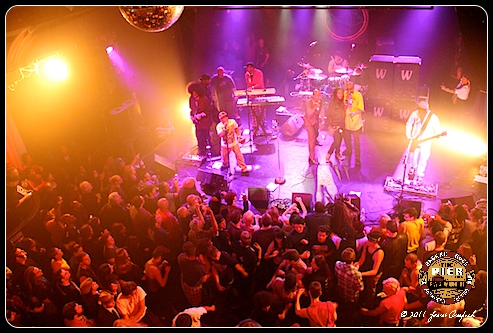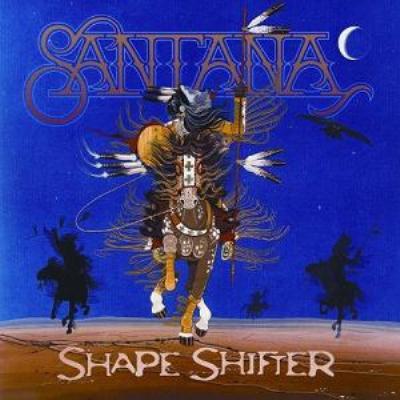
Jacob Hemphill from SOJA caught up with The Pier in between their trip from Hawaii back to the mainland while touring for Strength to Survive. The new album was released on January 31st, 2012, and the following day, Jacob went into detail about his favorite tracks off of the release, what he thinks will be the songs fans will enjoy, along with the process of recording an album under Dave Matthews’ very own ATO Records. During the interview, SOJA’s lead singer also explained his main goal with his music and writing, along with getting rid of today’s popular music, much like hair metal evaporated in the 1980s. Plenty of emotional and heartfelt responses behind SOJA’s writing process and bringing his love for music to the fans. Enjoy!
The Pier: Jacob, to start things off, I just want to thank you for taking the time out with The Pier to discuss the new release. After seeing the charts on the first day and where the album debuted at, can you give a run down for the few fans that have not yet picked up the record what your intentions were within writing Strength To Survive
SOJA: It is basically our attempt at making an older style of roots in our album. More of a look back to where roots and reggae was when Bob Marley was doing Survival, Confrontation and Uprising. Just real rootsy with a super hard drum and bass while putting the lyrics at the first and foremost of the record.

The Pier: Now, do you have any particular songs on the new album that you are anticipating the fans absorbing instantly? Any favorites you have?
SOJA: Yeah, there are always some songs that you expect to be popular, and on this record, “Not Done Yet”, “Let You Go” and more of that type of track. You know, the love song with a catchy hook. But, my favorites are actually the last three songs “Slow Down”, “Be With Me Now” and “When We Were Younger”. I think those songs are kind of the best we have done so far as a band. It is funny how the track listing happened for that.
The Pier: Can you compare the recent Born in Babylon writing and recording process to the Strength to Survive sessions? Was the whole layout similar and bring some comfort working in studio and at home? And, what about the Everything Changes track, was that a holdover from Born in Babylon or just a one-off track that fit this album?
SOJA: Everything Changes was actually the first song we wrote for this album, way back. As for the recording process, it was pretty similar to Born in Babylon. We recorded most of the instruments at Lion and Fox in Washington D.C., and we did my vocals and guitars, extras and that type of stuff at my house. Then we did some work out in L.A. and hopped on a plane and went over to Maryland and worked some there. It was a little jumping around from there, but the album turned out really great.
The Pier: How much influence did being under Dave Matthews’ label ATO Records have on this record and where did that connection sprout?
SOJA: My management, Elliot Harrington, actually saw the similarities between Dave’s  band and our band. And really, I always wanted to do a record with a rock producer and that is what Bob Marley did. So, I guess we had similar goals within the process. Different thoughts maybe, but certainly similar goals in the end. The opportunity came up and we said, “Yeah, that would be great!” It has been more John Alagia and me, and SOJA, doing the record rather than Dave.
band and our band. And really, I always wanted to do a record with a rock producer and that is what Bob Marley did. So, I guess we had similar goals within the process. Different thoughts maybe, but certainly similar goals in the end. The opportunity came up and we said, “Yeah, that would be great!” It has been more John Alagia and me, and SOJA, doing the record rather than Dave.
The Pier: Before the new album was released, you had listening parties for fans to get a peak at the album. What gave you guys this idea to give back to the fans?
SOJA: I had no idea! But I thought it was really cool to go on facebook and see all these events at bars they were going to, just to hear the album. It was really cool to see and get feedback. I really have no idea. (Laughs) Probably the record label, but the overall feedback of it was awesome.
The Pier: Within your music and your writing style, you take the negative and spin it towards the positive. As so many of the “popular” acts today spew out the negative. Your music inspires others to prosper. It has to feel good to see the music industry so accepting to this community’s uplifting message, right?
SOJA: Music right now is really interesting. I don’t know if you remember, but when metal was really big? Then, hair metal came out. And it became a thing about how do we take metal to the next level. That is, in my opinion, what is going on in music right now. Everyone is thinking about money, chicks and parties. Everyone is wearing skinny jeans and wearing makeup in their videos. It is a lot like what happened with metal. It gets bigger, bigger and bigger until it gets too big, and then all of these main-streamers get a hold of it, and then it dies. Then Kurt Cobain comes along and kills it to make sure we don’t see hair metal again. It’s funny when you look back on hair metal, and even the guys that played it say, “Yea, that was horrible!” or “Those ballads were crap!” (Laughs) They don’t even like it! Oh, man… “Girls, Girls, Girls” I can’t believe we wrote song called “Girls, Girls, Girls”. It was what it was though. Did they make a lot of money? Yea, but eventually someone comes along and crushes it. I’m not saying that is me, but somebody has to put an end this garbage music. It will just die by itself, it always does. When something goes too far, it kind of fizzes out.
The Pier: You mention the details of hair metal music videos with makeup and all that, SOJA recently released the music video for the new album’s title track “Strength to Survive”. What made you guys go with claymation to be the backdrop for the video?
SOJA: I think people keep expecting us to do what people want us to do, which if you look at the history of SOJA, literally not one time have we done what people wanted us to do. We kind of do what we want, and for “Strength to Survive”, we didn’t want a video where all of our faces are in it and chicks are like, “Oh, you’re so attractive. I want to marry you!” We didn’t want any of that. We wanted a video that was for real, this is what we are talking about and whether you get it or not, who cares? Some people are going to get it, and that is all that matters. So, the idea was to take the focus off of us and put the focus on the song. One of our buddies sent us an email one day and told us, “Hey, I love the music and just wanted to let you guys know I do clay…” None of it is computer generated. It is really amazing the way he takes the little scenes together. It truly is great. We have always loved clay. I mean, I remember when the first Tool video came out. It was unreal. I have loved claymation probably since I was six-years-old. I thought it was the coolest thing ever. So, a lot of us were into clay, and that song seemed like a perfect song to not have us in the video and shift the focus.
The Pier: How has the fan reaction been thus far? The video has been all over online and on search engine home pages when it was released. What was that like to see?
SOJA: Well, it was the first video that we spent any money on. (Laughs) The other ones were shot in a day and then we would see what’s going down. For us, we figured it out along time ago. The closer we get to the fans, the more they like what we produce. Like the video we shot in my apartment and we are shooting it up close, right there. We did some stuff up the street at a local bar, and it is personal. Those will always be the favorites. No fault in that, you know? I love getting to know the artist that I connect with. For the “Strength to Survive” video, we kind of expected this to be an underground type of video. We were exited to see all the views right at the start, because we’re not in it one time! It’s very cool to see it all about the music.
The Pier: Connecting with the fans and getting as close as possible is  something SOJA does really well. You guys are certainly not new to the game, and your fan base branches to nearly every continent, do you see the fan bases expanding globally for more American reggae-rock bands, much like the excitement has grown for SOJA?
something SOJA does really well. You guys are certainly not new to the game, and your fan base branches to nearly every continent, do you see the fan bases expanding globally for more American reggae-rock bands, much like the excitement has grown for SOJA?
SOJA: I think people like to see the whole band. I think people got tired of just seeing the artist. I think American bands are kind of providing that for people. Reggae used to be about this band, or a crew. It hasn’t been about that for twenty or thirty years. I think American bands are filling that void, especially for reggae bands. That is kind of our role right now.
The Pier: As one of the flagship bands for reggae on the east coast, along with The Movement and Giant Panda Dub Squad among many more, how do you guys see yourself and find similarities and traits with the Southern California reggae bands that have been on a wave since the late 1980s?
SOJA: A lot of people put us in that group, and I see a lot of similarities. Between east and west coast, there are not too many differences. I think between SOJA and any other band in the world, there are a lot of differences. But as far as our whole scene, were all in the same boat. We are just doing our thing together and finding our sound.
The Pier: Now, you have had some big time collaborations on previous albums, and most recently with Rebelution and Eric Rachmany and Chris Boomer. Explain your writing process with these guys since you’re in D.C., and they are on the west coast. Eric said it only took a couple phone calls and “Meant To Be” was complete…
SOJA: Yea, I think that is kind of like my M.O. in the industry. “Jacob will write it in thirty seconds…” But, I mean, that is just how I am when it comes to music. I write most of these songs in two minutes. If a song is taking more than ten minutes I ditch it. Comeback later, maybe never comeback to it at all. But, for those Chris Boomer songs, he flew to my house. We sat down, and I didn’t have anything written. I gave him one song to kind of start on. Had another one written when he finished singing that one. Handed it to him, and then went to work on another song. Three days later we had ten songs written and recorded. We then picked the five that we liked most and put them out. Writing is kind of my thing and always has been. People trip out a lot. For that “Suffering” remix with Rebelution, I was sitting on a speaker in Santa Cruz, CA when Rebelution was sound-checking and they played it one time. I wrote it and then hopped off the speaker and asked them to play it again. Then I sang the verse. Everyone sort of looked at me and was like, “This is crazy!” For me, the writing is the really fun part and the really easy part. That’s the part where you really get to express yourself. I guess I am maybe known for expressing the shit out of myself (laughs), but yea, that part usually comes pretty quick.
The Pier: Writing in that time span means it is coming from the heart with true emotion and feelings. Along with that, I heard that you are going to be on Anuhea’s upcoming Valentine’s Day album release. Are there differences or similarities with recording alongside a female vocalist?
SOJA: To me there is no difference. The song I wrote for her is a very sad love song. For someone else, you have to kind of run the song and idea behind them first and see whether their eyes light up. We sit around for a little bit and analyze it, see what works and what fits. It is more about recognizing someone’s eyes whether or not they are a  man or a woman, normally. I don’t write songs for someone to look like something. Most music is written for a point, you need a this or you need a that. Like when you build a house, you need a sink. Okay, we got a sink. Now, we need a toilet. Okay, now we have that, so we need a roof. Oh, we don’t have a roof. We need a roof. How pop music is kind of written is you look at a song as, “What does it need?” When I write songs, I write them to see what they want. What does this song want? Does it really want a bass right here, or would that kind of step all over the verse? Sometimes pop music demands that there be a bridge right there. For me, it is all about writing a song, talking it through, letting it breathe. If it sounds perfect, leave it alone. If it needs a little something, then give it to it. Normally, less is more in my opinion.
man or a woman, normally. I don’t write songs for someone to look like something. Most music is written for a point, you need a this or you need a that. Like when you build a house, you need a sink. Okay, we got a sink. Now, we need a toilet. Okay, now we have that, so we need a roof. Oh, we don’t have a roof. We need a roof. How pop music is kind of written is you look at a song as, “What does it need?” When I write songs, I write them to see what they want. What does this song want? Does it really want a bass right here, or would that kind of step all over the verse? Sometimes pop music demands that there be a bridge right there. For me, it is all about writing a song, talking it through, letting it breathe. If it sounds perfect, leave it alone. If it needs a little something, then give it to it. Normally, less is more in my opinion.
The Pier: Now, the tour you are currently on with The Green, Fear Nuttin’ Band, The Movement, Trevor Hall and a few others for openers, almost of all of which SOJA has influenced. How does it feel to have such a strong impact on these artists and potentially collaborate on stage during the tour?
SOJA: There are definitely going to be collaborations. You can guarantee it. The Movement, they have been our homies from long, long ago. Trevor Hall we actually met on the Rombello Cruise last year. That guy is a super cool gentleman who will be on a couple dates with us, and we have done a couple tours with him. So, all these guys we’re buddies with, so for the fans to see it all the collaborations will be fun. But, I don’t really know if SOJA has directly influenced people. I think people look at SOJA and they say, “Okay, these guys are popular, supporting themselves off their craft and what they believe in, and at the same time they sing about super real stuff.” It is the same as it is with most reggae bands. We kind of all influence each other. There isn’t really a leader and a group of followers. Everyone is kind of making their way down this road that there isn’t really a blueprint for, and there is no backing from the music industry. The music industry doesn’t see reggae as an actual genre, it is more of like a gimmick. So, we are kind of doing our own thing. It’s like a bunch of kids who have a substitute teacher and can’t take it and they left because it was gym class. But to us, it is not gym class, this is like the realest music ever, and we laugh at most music that is out there today. We have so many people coming to the shows, I mean every single show so far has been sold out. For us, I think we are all trying to find our way. Every band is a little bit different. Every writing style is a little bit different, instrument set up, personal style, and song content is all a little bit different between each band, but there is something that unifies all of us. There is no real leader, there is just a few that have moved forward a little bit quicker, or maybe even not. It all depends on how you look at moving forward. Is moving forward ticket sales? Or is moving forward putting out the best album of the year? Or is moving forward putting reggae on television? I don’t know. We are all trying to get somewhere, but moving at our own paces.
The Pier: For SOJA, what is the main goal in mind?
SOJA: My goal is to make people think about what they are doing to the earth and the people that live in it. My goal is to talk to the rich part of the world, and tell them about the poor side of the world, to mention that we are all one people. Until we start acting like it, we all stand to die, because we are fighting over these fake borders and pieces of paper. To the poor side of the world, I say to them, “There is a chance that this thing is going to turn around, but not unless we do it together.” The whole reason I am talking to rich and poor is to make a stake and a claim for the earth. The main thing is, can we survive while we compete in war over things that don’t exist. Is that anyway to thrive and survive? And, the answer is no. So, my main point is mentality changes everything. So, I am just trying to talk about stuff that will bring out the question of “What is my day-to-day mentality and how do I look at the world?”
The Pier: The Pier: With that mentality, plenty of things could be different. For the Strength To Survive album, the true message comes through. The album was almost two years in the making, what’s on the horizon next for SOJA?
SOJA: I have probably about two-thirds of the next album already written. It’s always different, but I like to come in at the end and write three or four more about what is going on in the news in the present day. But, I have the main stuff written, and the band has about half of that close to done. So, if we set out to finish the next record today, then we would probably be done in a month. Obviously we are on tour for Strength To Survive, and all of us are really pumped to be playing that stuff. But, the next album is close to written. So, there are plenty of good things from SOJA in the future.
The Pier: That’s always good to have the next set of songs lined up, and lots for the fans to look forward to in the future. We are all grateful for the time and appreciate the responses. Good luck on tour, Jacob!
SOJA: Thanks, It has been a pleasure!
Interview by: Kris Siuta
-Read Kris Siuta’s Official Album Review for Peace of Mind by clicking HERE
Photos by: Bill Colbridge
SOJA Links:
Strength to Survive Album Review
SOJA Editorials
SOJA Show Locator
SOJA Website





